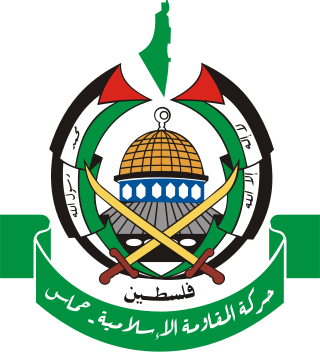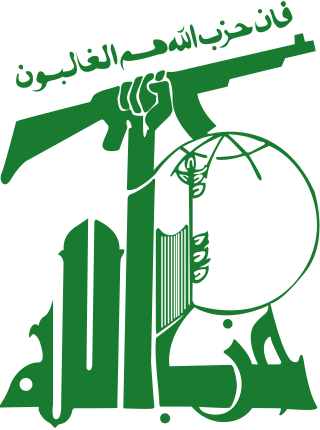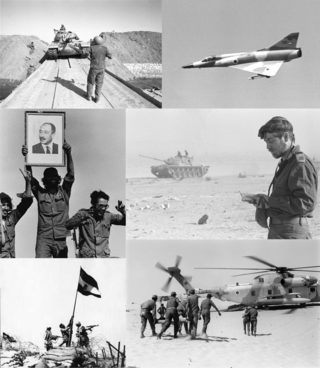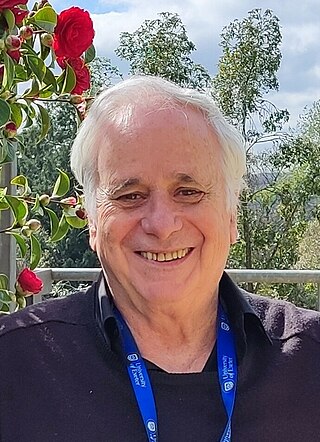External links
| Thargelia gigantea | |
|---|---|
| Thargelia gigantea | |
|---|---|
| Scientific classification | |
| Kingdom: | |
| Phylum: | |
| Class: | |
| Order: | |
| Family: | |
| Genus: | |
| Species: | T. gigantea |
| Binomial name | |
| Thargelia gigantea Rebel, 1909 | |
| Synonyms | |
| |
Thargelia gigantea is a species of moth of the family Noctuidae. It is found from Morocco to Algeria, Libya, Israel and the Sinai in Egypt.
Adults are on wing from January to April. There is one generation per year.

The Gaza Strip, or simply Gaza, is a polity and the smaller of the two Palestinian territories. On the eastern coast of the Mediterranean Sea, Gaza is bordered by Egypt on the southwest and Israel on the east and north.

Hamas, an acronym of its official name, Harakat al-Muqawama al-Islamiya, is a Palestinian Sunni Islamist political and military movement governing parts of the Israeli-occupied Gaza Strip since 2007.

Hezbollah is a Lebanese Shia Islamist political party and paramilitary group, led since 1992 by its Secretary-General Hassan Nasrallah. Hezbollah's paramilitary wing is the Jihad Council, and its political wing is the Loyalty to the Resistance Bloc party in the Lebanese Parliament. Its armed strength is assessed to be equivalent to that of a medium-sized army.

Jerusalem is a city in the Southern Levant, on a plateau in the Judaean Mountains between the Mediterranean and the Dead Sea. It is one of the oldest cities in the world, and is considered holy to the three major Abrahamic religions—Judaism, Christianity, and Islam. Both the State of Israel and the State of Palestine claim Jerusalem as their capital city. Israel maintains its primary governmental institutions there, and the State of Palestine ultimately foresees it as its seat of power. Neither claim is widely recognized internationally.

The Six-Day War, also known as the June War, 1967 Arab–Israeli War or Third Arab–Israeli War, was fought between Israel and a coalition of Arab states from 5 to 10 June 1967.

The West Bank, so called due to its location relative to the Jordan River, is the larger of the two Palestinian territories. A landlocked territory near the coast of the Mediterranean Sea in the Levant region of West Asia, it is bordered by Jordan and the Dead Sea to the east and by Israel to the south, west, and north. The territory has been under Israeli occupation since 1967.

The Yom Kippur War, also known as the Ramadan War, the October War, the 1973 Arab–Israeli War, or the Fourth Arab–Israeli War, was an armed conflict fought from 6 to 25 October 1973, between Israel and a coalition of Arab states led by Egypt and Syria. The majority of combat between the two sides took place in the Sinai Peninsula and the Golan Heights—both of which had been occupied by Israel in 1967—with some fighting in African Egypt and northern Israel. Egypt's initial objective in the war was to seize a foothold on the eastern bank of the Suez Canal and subsequently leverage these gains to negotiate the return of the rest of the Israeli-occupied Sinai Peninsula.

Yasser Arafat, also popularly known by his kunya Abu Ammar, was a Palestinian political leader. He was chairman of the Palestine Liberation Organization (PLO) from 1969 to 2004 and president of the Palestinian National Authority (PNA) from 1994 to 2004. Ideologically an Arab nationalist and a socialist, Arafat was a founding member of the Fatah political party, which he led from 1959 until 2004.

Zionism is an ethnic or ethno-cultural nationalist movement that emerged in Europe in the late 19th century and aimed for the re-establishment of a homeland for the Jewish people in Palestine, a region corresponding to the Land of Israel in Jewish tradition, an area deeply embedded in Jewish history, religion and the identity. Following the establishment of the State of Israel in 1948, Zionism became an ideology that supports the development and protection of Israel as a Jewish state, in particular, a state with a Jewish demographic majority. It has also been described as Israel's national or state ideology.

The 1948 Arab–Israeli War, also known as the First Arab–Israeli War, followed the civil war in Mandatory Palestine as the second and final stage of the 1948 Palestine war. The civil war became a war of separate states with the Israeli Declaration of Independence on 14 May 1948, the end of the British Mandate for Palestine at midnight, and the entry of a military coalition of Arab states into the territory of Mandatory Palestine the following morning. The war formally ended with the 1949 Armistice Agreements which established the Green Line.

The Israel Defense Forces, alternatively referred to by the Hebrew-language acronym Tzahal (צה״ל), is the national military of the State of Israel. It consists of three service branches: the Israeli Ground Forces, the Israeli Air Force, and the Israeli Navy. It is the sole military wing of the Israeli security apparatus. The IDF is headed by the Chief of the General Staff, who is subordinate to the Israeli Defense Minister.

The Israeli–Palestinian conflict is an ongoing military and political conflict about land and self-determination within the territory of the former Mandatory Palestine. Key aspects of the conflict include the Israeli occupation of the West Bank and Gaza Strip, the status of Jerusalem, Israeli settlements, borders, security, water rights, the permit regime, Palestinian freedom of movement, and the Palestinian right of return.

Benjamin "Bibi" Netanyahu is an Israeli politician, serving as the prime minister of Israel since 2022, having previously held the office in 1996–1999 and 2009–2021. He is chair of the Likud party. Netanyahu is the longest-serving prime minister in Israel's history, having served a total of over 16 years.

Palestine, officially the State of Palestine, is a country in the southern Levant region of West Asia. It encompasses two disconnected territories — the West Bank and the Gaza Strip, collectively known as the Palestinian territories — within the larger region of Palestine. The country shares its borders with Israel to north, west and south, Jordan to the east and Egypt to the southwest. It has a combined land area of 6,020 square kilometres (2,320 sq mi) while its population exceeds five million people. Its proclaimed capital is Jerusalem while Ramallah serves as its administrative center and Gaza City was its largest city until massive population movements began in 2023 due to the Israeli invasion of the Gaza Strip. Arabic is the official language. The majority of Palestinians practice Islam while Christianity also has a significant presence.

The Israel national football team represents Israel in men's international football, and is governed by the Israel Football Association. They have been members of the European Confederation UEFA since 1994.

Ilan Pappé is an Israeli historian, political scientist, and former politician. He is a professor with the College of Social Sciences and International Studies at the University of Exeter in the United Kingdom, director of the university's European Centre for Palestine Studies, and co-director of the Exeter Centre for Ethno-Political Studies. Pappé was also a board member of the Israeli political party Hadash, and was a candidate on the party list in the 1996 and 1999 Israeli legislative elections.

The 2006 Lebanon War, also called the 2006 Israel–Hezbollah War and known in Lebanon as the July War and in Israel as the Second Lebanon War, was a 34-day military conflict in Lebanon, northern Israel and the Golan Heights. The principal parties were Hezbollah paramilitary forces and the Israel Defense Forces (IDF). The conflict started on 12 July 2006, and continued until a United Nations-brokered ceasefire went into effect in the morning on 14 August 2006, though it formally ended on 8 September 2006 when Israel lifted its naval blockade of Lebanon. Due to unprecedented Iranian military support to Hezbollah before and during the war, some consider it the first round of the Iran–Israel proxy conflict, rather than a continuation of the Arab–Israeli conflict.

The Arab–Israeli conflict is the phenomenon involving political tension, military conflicts, and other disputes between various Arab countries and Israel, which escalated during the 20th century. The roots of the Arab–Israeli conflict have been attributed to the support by Arab League member countries for the Palestinians, a fellow League member, in the ongoing Israeli–Palestinian conflict; this in turn has been attributed to the simultaneous rise of Zionism and Arab nationalism towards the end of the 19th century, though the two national movements had not clashed until the 1920s.

The Jews or Jewish people are an ethnoreligious group and nation originating from the Israelites of the ancient Near East, and whose traditional religion is Judaism. Jewish ethnicity, religion, and community are highly interrelated, as Judaism is an ethnic religion, although not all ethnic Jews practice it. Despite this, religious Jews regard individuals who have formally converted to Judaism as part of the community.

The Institute for Intelligence and Special Operations, popularly known as Mossad, is the national intelligence agency of the State of Israel. It is one of the main entities in the Israeli Intelligence Community, along with Aman and Shin Bet.